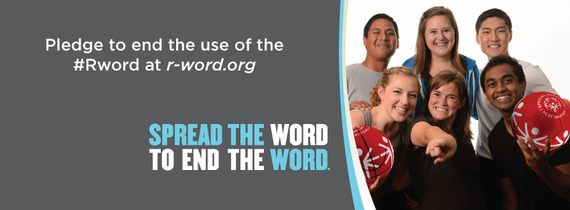Wednesday, March 2, 2016 is the annual day of activation to Spread the Word to End the Word®, a campaign urging society to end the use of the R-word. Why is this so important and what can you do?
Samuel Beckett, the novelist and poet observed, "Words are all we have." If that is true, then we need to be mindful of those we use.
Spread the Word to End the Word was started by youth and is an ongoing effort of Special Olympics and Best Buddies. For the last six years, the Golisano Foundation has joined Special Olympics in helping to promote respect and inclusion and end the use of the "R word" with our constituents.
Anna Fallon, a 21-year-old student at the University of Rochester (Transition Opportunities program), has cerebral palsy. She says, "Sometimes people can say insensitive things. In my case, I have heard things like: 'Why do you walk so slow?' or 'Why can't you talk right?' One time a girl in my high school PE class cussed at me when I mistakenly hit her with a ball. I wish I could tell everyone to pause before judging and name calling. I think if the person who asked me why I walk slow had rather said, 'I notice you walk slow or different than I do, why?' it would feel different. I don't mind answering questions about my disability, in fact I like it when people ask me because it shows me they care."
Most people who use the words 'retard' or 'retarded' do not mean to be hurtful, but to the millions of people around the world who have intellectual and developmental disabilities, and their families and friends, it is hurtful, and as cruel and offensive as any other slur. There is no one who can express the hurt more so than someone who lives with a difference.
At the Golisano Foundation, we have made it our mission to create communities of acceptance and inclusion for people with intellectual disabilities. We're working hard to ensure that people with intellectual disabilities are treated with dignity and respect and are valued for their abilities.
The subjects of name-calling and exclusion are not the only victims. Whether it be out of fear of differences, lack of understanding or careless thoughtlessness, using words that are hurtful creates barriers and prevents us from fully understanding and benefitting from the unique abilities we all have to offer when we live together with mutual caring and respect.
My friend Rick Rader, MD, Co-Founder, American Association of Developmental Medicine and Dentistry, offered a fresh perspective that challenges us to go beyond the traditional pursuit of inclusion and think about the benefits of togetherness.
"We do not learn anything by simply 'including,' 'allowing,' or 'permitting' others to live and work alongside of us," he says. "We do not profit or grow by 'accepting,' or 'welcoming' people with disabilities. We, as a neighborhood, community and society learn, grow and profit by 'believing' in the sanctity, value and merit of 'together.' The essence of 'together' transcends 'inclusion.' Those who believe that being together, not by mandate, statute or fiat; is the only way we can benefit from the joys, challenges and perspectives that 'believing in being together' can be promoted and realized."
This perspective was the basis for the Golisano Foundation Move to Include Awards presented in October to those who live and act in the purest realm of move to include.
So let's take down the barriers that hurtful words create. Let's all move to include and be mindful of being respectful of those with differences because it's the humane and right thing to do and it allows us to realize the benefits and joys of being together.
One person at a time, one community at a time, through greater awareness we can inspire others to make a dramatic change - and to think before using words that perpetuate the stigma and negative stereotypes.
So what can you do?
Help us build the awareness and keep the message going. Each year we reach out to more people who can spread the word and pledge to use respectful language that promotes more accepting attitudes for all people including those with intellectual and developmental disabilities who have unique gifts and talents to share with the world.
Please forward this article to as many people as you can - your colleagues, donors, family and friends, schools, youth groups and constituents - to take the pledge and join the movement to end the r-word and use the new r-word, respect. It's easy, it doesn't cost anything, it takes just a minute and it can make a big difference.
Words matter. Please take the pledge today at r-word.org.
This post is part of a series produced by The Huffington Post and the Special Olympics in conjunction with Spread the Word to End the Word awareness day on Wednesday, March 2. To find out more about the Spread the Word campaign, please visit the website. Join us in taking the pledge at R-Word.org.

